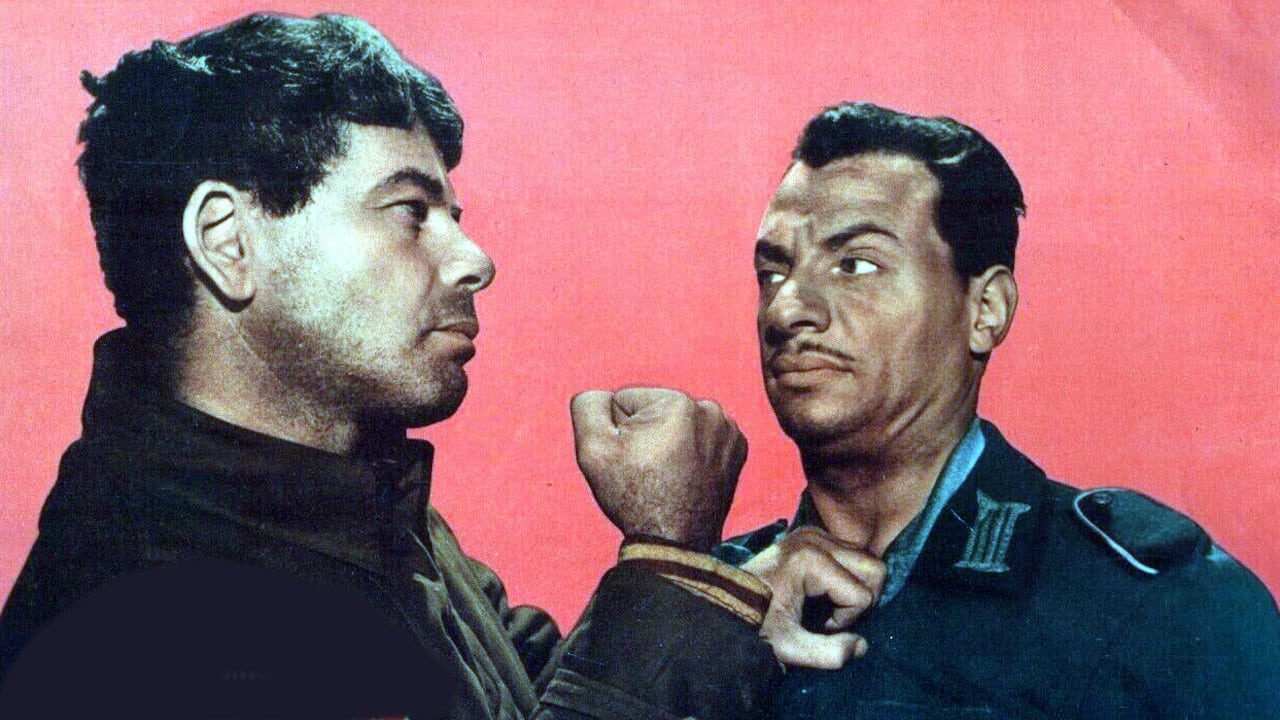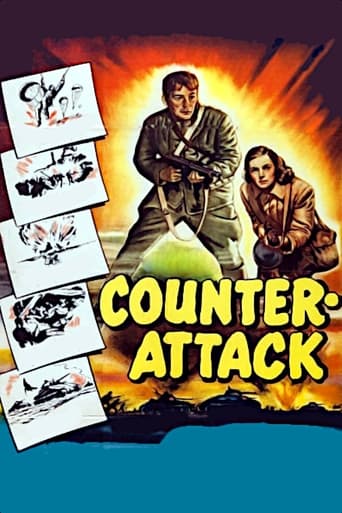



Nice effects though.
Good idea lost in the noise
One of the best movies of the year! Incredible from the beginning to the end.
View MoreAn old-fashioned movie made with new-fashioned finesse.
View MoreProduced and directed by Zoltan Korda with a screenplay by John Howard Lawson from an adaptation by Janet Stevenson and Philip Stevenson of Pobyeda, a play by Ilya Vershinin and Mikhail Ruderman, this psychological war drama features Paul Muni as Alexei Kulkov, a Russian soldier who, along with a female resistance fighter as his assistant Lisa Elenko (Marguerite Chapman), finds himself in a position to extract vital intelligence information from some Nazis that he's taken prisoner while all are trapped in a bombed out building.It's 1942 and the Russians have been driven back such that the German front is a thousand miles into their own country. But Ostrovski (Ian Wolfe, uncredited) and Colonel Seminov (George Macready) have a plan - to build an unseen bridge eighteen inches under the river which will enable Russian tanks and troops to cross - the first step of which is to drop paratroopers behind enemy lines. Among these are Kulkov, his German Shepherd dog and Kirichenko (Larry Parks), who are led by Elenko once they land. They attack the German stronghold at a factory and the Russians win the battle until an alerted squadron of enemy planes bomb the facility, trapping Kulkov and Elenko with seven German soldiers that they'd just discovered and captured. Fortunately, Kulkov's dog sniffed out this fact and, using a kind of Morse code on a pipe that extends from the room to the surface, Kirichenko learns the situation from his comrade and decides to venture back across the river to inform his commanding officers.By flashlight, lantern, then even candlelight, Kulkov and Elenko take turns keeping a machine gun trained on the Germans at the other end of the large room. Over the course of many hours, Kulkov uses his cunning and reasoning abilities to learn that among his prisoners is a German officer who might have important information that will help his country's counterattack. Of course, the Nazis do their best to keep the identity of their officer a secret while they scheme to overcome the increasingly tired Kulkov and Elenko, who is stabbed in a brief scuffle that ensues when the lantern is knocked out. As the hours become days, through interrogation and tricks, Kulkov learns the identity of the officer and then plays a dangerous game of "who knows what" during which he reveals more than he intended about the "invisible" bridge being built by his countrymen. When the trapped hear digging and voices on the surface, they know that the end is near but it's unclear who it is. Kulkov knows that he must kill his Nazi prisoners if it's Germans who are about to rescue them, but it turns out to be his Russian comrades, dog and Col. Seminov, who is thrilled to learn the location of his enemy's concentration.
View MoreNot much a "counter-attack" but a "stuck behind enemy lines" movie. I also saw this on Turner Classic Movies and that's probably the only place you'll ever see this movie as it has little main stream appeal. Think of this as a remake of "Sahara" without all the cool action, just the constant diatribe dialog. Released (according to IMDb) less then one month before the fall of Nazi Germany, this movie was clearly a propaganda war movie among all the rest to motivate the masses in America. Except I question who or even where this film would have been shown to. I guess like where most of the previous reviewers here live, it was shown in the North East (mainly New York City) and probably in Chicago. Since Communism was still a slightly mainstream political movement in America, I guess it was also made for those people in America to help support the war effort more. In only about one year things would dramatically change starting as soon as only a few months when Russia would not declare war on Japan until less then a month before the A bomb and total surrender so they could take part of the spoils. Then of course the Iron Curtain would go up and well, I'm sure surprised this film was even found in the vaults after all this time. One chilling scene if I can just point it out, is when the Leader says that a word does not exist anymore and that you cannot find it in the dictionary anymore, and Muni crosses out that word in his pocket dictionary. This would be reprised in the movie "Alphaville" where the society's leader erases words and the people can no longer use the word "love". It's hard for me to root for one s-bag group that is only slightly less s-bagish then the other group. Anyway, I like Muni and I liked Korda in some of their other works and I like war movies and had never seen this one, so I gave it a try. It's not out of line with anything else done at the time, it's just that there aren't many good war movies made during the war because they are all done for propaganda. 5 of 10, I see many others enjoy this but they are probably Travelers so take that into account.
View MoreI was 7 years old when I saw this movie in 1945. the war swirled around me and this was a movie about success against an enemy of America. At 7, you have no political insights as to what is going on. It's the "good guys vs. the bad guys", the "cowboys vs. the indians" from a little kids perspective, and I was for the good guys, which in this case were the Russians. I guess it was OK to root for the Russians as long as we had a common enemy. This was my first exposure to propaganda movies, but not my last. When Paul Muni and Larry parks were identified as "Commie supporters" after the war was over, they paid a price for what they believed in. With the Communist conspiracy lurking, this hysteria impacted and destroyed a lot of people, a sad day for our country. Obviously, this movie made an impact on me, as it still is one of my favorites, all politics aside. From a historical perspective, it showed, that the Russians weren't always our enemies, a fact we would rather not acknowledge today. I guess it will always hold true, that "the enemy of my enemy, is my friend".
View More***SPOILERS*** A bit drawn out and looking a lot more like a play, which the story originally was, then a movie Counter-Attack looks like it was filmed in almost total darkness. With just one or two scenes outside the factory basement, where most of the film takes place, where there was any sunlight at all. Leading an attack on German units across the river a team of Russian commandos are shot to pieces with only two of the group Alexie Kulkov and Lisa Elenko surviving. Trapped underground in a German occupied Russian factory the two Russians, who are the only ones with firearms, find themselves together with seven also trapped German soldier's! That leads to a standoff between the two combatants each trying to get information out of each other. With the hope if they survive or are rescued by their own men it would help in the battle shaping up outside between their two armies.It what later turns out to be a battle of wills the Russian private Kulkov and German officer Von Sturmer who play a deadly game of cat and mouse. Feeling out each others strengths and weaknesses as the fighting goes on outside. With both of them, Kulkov & Von Sturmer, having no idea who's side is not only winning but is in control of the devastated factory where both of them, with their fellow comrades, are trapped in.Not the usual war film that you would have expected with most of the fighting not taking place on screen or among the cast members. Instead concentrating on how fear of the unknown in who's outside, the Germans or Russians, to either save execute or imprison them as well. Lack of sleep also drives the men, and one woman, to the point of madness far more then exploding bombs artillery shells and bullets coming from the other side of the battle-line.What surprised me most about the movie is how it portrayed the German, who were the bad guys in the film, in putting them almost on an equal footing with the Russians, the films good guys, on moral issues. Like being more then ready to gun down each other if members of the opposing side is the first to come to their rescue. Because of the slow pace and darkness it's hard to follow what exactly is happening. There's a confusing scene with Lisa during an attempt by the captured Germans to overpower her. There's also Kulkov when the what little light there was in the cellar, from a flashlight, went out we find her badly injured and even dying from a knife wound. Yet later she seemed to have completely recovered without as as much as a scratch on her only to see her much later on at the very end of the movie being carried out on a stretcher! Again being on the brink of death from her knife wound by the Red Army troops and medics who broke into the cellar to rescue her and Kulkov!The movie was also a little hard to swallow in that one of the Germans soldiers Pvt. Stillman trapped with both Kulkov and Lisa was crazy enough to go over to their side. thinking that it would save his skin. This in the spring of 1942 when the Germans were well on their way, or so it looked at the time, of winning the war against the USSR. Also in regard of the Red Army's brutal treatment, the USSR in fact didn't sign the 1929 Geneva accords in the human treatment of POW's, of German prisoners it made you wounder why Pvt. Sillman would voluntarily give himself up in the first place! It made no sense, unless he just lost his mind, and was driven to become a traitor to his country and fellow German soldier's. With his family back home facing a stay in a German concentration camp and him being shot by the Gestapo or being sent to Siberia by the NKVD if either one got there, the cellar, first!
View More